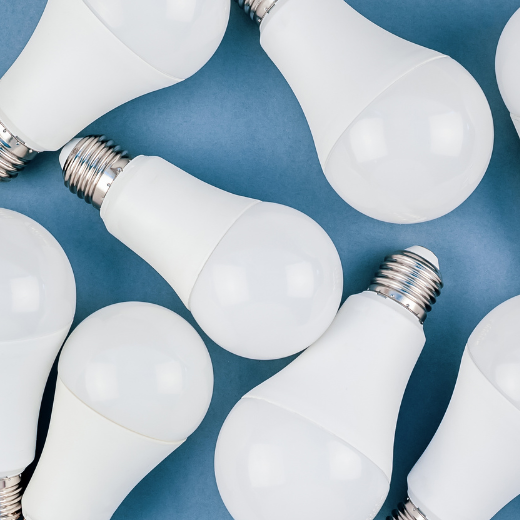Alert:

Home is where the heart is. It’s also where the energy bills are. From month to month, your electricity or natural gas bill can change dramatically, depending on how you’re using energy at home.
Whether you rent an apartment or own a single-family house, you can improve your experience at home while saving money with a few simple changes.
Making smart choices about energy use and water use can increase your comfort at home and reduce your out-of-pocket costs, while also benefiting our neighbors and the broader community by reducing energy use and lowering greenhouse gas emissions.
On this webpage, you’ll find information, resources and assistance to encourage energy-saving activities and behaviors at home.
The Fairfax Energy Compass program is your new FREE local resource to help make your home more comfortable and use less energy. The program’s Energy Navigators are available now to answer your technical questions, identify relevant incentives, and offer a list of certified contractors.
Fairfax County has partnered with Solar United Neighbors to offer Switch Together Fairfax County, a group buying program for heat pump installations. Upgrading to a modern electric heat pump can help residents increase home comfort and savings. Residents switching from oil or propane to an energy-efficient heat pump can expect the highest savings, but the program is open to all homes, including those switching from natural gas or electric furnaces.
The first step to reducing your bills is being aware of how much energy you use, and it’s easier than you think.
Use the U.S. Environmental Protection Agency (EPA) Carbon Footprint Calculator to estimate your greenhouse gas emissions and learn the numbers behind your personal choices and habits at home. Using basic information about your household size, general location, and home energy costs, the calculator identifies ways to reduce your emissions and provides estimated annual savings.
How to evaluate your household numbers:
While you’re evaluating your home energy use, you should also look at how other daily activities like driving your car contribute to greenhouse gas emissions – by reviewing your car’s fuel bills, vehicles miles traveled and average mileage.
Read our Know Your Numbers: The Cost Savings of Climate Action article to learn more.
Ready to take it a step further? A home energy assessment, also known as a home energy audit, lets you know how energy efficient your home is. It identifies problem areas and recommends improvements so you can save energy and money on your utility bills month after month.
During a home energy assessment, a contractor will examine your home for upgrades and repairs that can save you both energy and money. At the conclusion of the assessment, you will be provided with a personalized report with suggested changes and actions to help keep your energy costs down.
If you choose to act on any of the recommendations, you may qualify for federal tax incentives or one or more rebates from your utility provider.
Read Get to Know Your Energy Use (and Discover Ways to Save) with an Energy Assessments article to learn more.
While a home energy assessment by a licensed energy auditor will provide the most comprehensive results, there are many do-it-yourself steps that you can take on your own to improve your home's energy efficiency. The following EPA and U.S. Department of Energy online resources can help you conduct your own energy assessment and identify improvements:
 projects at Energy Savings at Home.
projects at Energy Savings at Home.THERMAL CAMERA LOAN PROGRAM AND CONSERVE KITS
Fairfax County residents can reserve thermal imaging cameras and Conserve Kits from any branch of the Fairfax County Public Library. Use the camera to inspect your home or business for hot and cold spots, then make energy saving upgrades with the Conserve Kit.
Home electrification means operating your home on electricity rather than fossil fuels like natural gas.
Electrifying your home may involve removing a natural gas heating system and replacing it with a more efficient electric heat pump or replacing gas appliances like ovens, dryers and hot water heaters with electric, ENERGY STAR®-rated ones. Replacing all of your fossil fueled appliances all at once can be expensive, but you don’t have to do them all at once — you can replace things as they fail.
Depending on the size of your current electrical panel, you may also need an upgrade, or you may need to add a sub-panel to support higher electrical load. This is especially true if you are planning to install an electric vehicle charger in the future. You can further take advantage of clean electricity by buying renewable energy credits or by generating your own electricity from renewable energy sources like rooftop solar panels.
In addition to the cost savings from lower utility bills, there are also rebates on individual appliances, tax credits and financing options available to help pay back your initial investment. Check out Rewiring America for more information on how to Electrify Everything in Your Home.
If you’re in the market for a new fridge, washing machine, or other major household appliance, look for the ENERGY STAR label to ensure you’re getting the most energy-efficient model. This certification from the EPA indicates that a product is more efficient than its conventional counterparts.
Investing in ENERGY STAR technology can save you energy and money over time. A new ENERGY STAR refrigerator is about 15 percent more energy efficient than the minimum federal standard for refrigerators and can cost you about $50 a year to run, on average, while a full-size electric ENERGY STAR washer can save more than $350 in energy costs over the lifetime of the product.
Use the ENERGY STAR Rebate Finder to find available rebates and special offers on ENERGY STAR-certified products.
In addition to saving money over time by purchasing energy-efficient appliances and technology, you can also receive rebates from local utilities for your investment. If you are a customer of Dominion Energy, you can find available rebates for ENERGY STAR purchases online.
Even small actions, like changing out inefficient light bulbs or sealing cracks around windows and doors, can make a big impact. If everyone in Fairfax County took these simple steps, we would be on our way to achieving our goals for greenhouse gas reduction.
SWITCH TO LEDs
Save money just by switching to LEDs, or light-emitting diodes, which are more efficient and longer-lasting than standard incandescent bulbs.
For more information about LEDs and choosing the right bulb for your home, visit our Guide for Energy-Efficient Lighting.
ADJUST THE THERMOSTAT
One of the simplest ways to avoid paying too much for energy is to adjust your thermostat. If you have a programmable thermostat, use it to establish a schedule in the winter months so that your house is warmer when you’re home and awake and cooler when you’re away or sleeping. The same strategy applies in the summer months: set the temperature as high as is comfortable when you're home and warmer than normal when you're away. Even one or two degrees either way can make a big difference.
If you don’t yet have a programmable thermostat, consider purchasing one. Dominion Energy is currently offering up to $30 in rebates to customers who purchase a smart thermostat and even more savings for those who enroll in its smart thermostat rewards programs. In the interim, set an alarm on your phone or clock to remind you to adjust your thermostat before you leave or when you get home.
LOOK FOR LEAKS
HVAC systems are the biggest energy hogs in buildings and you pay for every bit of energy used to heat or cool your home. Don’t let your dollars slip away through cracks or gaps around your windows, doors, and exterior outlets.
Use a thermal camera to check for air leaks around your house, and then install weatherstripping or use caulk to close them up. Also, consider using socket sealers to prevent air from leaking out through electrical outlets or light switch plates on exterior walls of your home. Read Seal Air Leaks as the Weather Turns Colder to learn more.
Search your house for energy vampires, or those devices that continue to suck electricity even when they’re “off.” Vampires are usually easy to spot as they often include an indicator light that glows even when you’re not using them.
If your energy vampires are centered around an entertainment center or home office set up, consider using a smart power strip which allows you to turn off a handful of related electronics or appliances when a single piece of tech is turned off. Otherwise, try to remember to unplug these devices when they're not in use. Read our article to learn more about vampire energy.
Discover more Energy Saving Tips.
Consider a renewable source of energy like the sun to power your home. Solar power can pay for itself in 10 to 20 years, so you’ll enjoy reduced energy bills, including extra protection from power loss during extreme weather when you invest in storage solutions.
Visit our Going Solar in Fairfax County page to learn more
Federal, state, and energy provider incentives can help Fairfax County residents offset the costs of purchasing and installing energy-efficiency upgrades and equipment.
Government Incentives (Federal, State, County)
There are currently no federal tax credits for energy efficiency home improvements.
Other government incentive programs include:
Additionally, the programs below offer assistance options for low-income households:
Utility Rebates and Incentives
Visit our Buildings and Energy page to find information and resources for exploring how cleaner and greener energy can be used to power our homes and businesses. This includes lowering your costs and your carbon footprint by being more energy efficient, adopting green building standards, and investing in renewable sources of energy such as solar.
